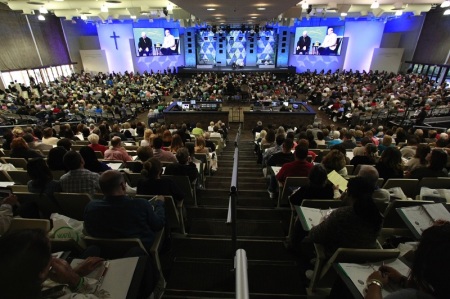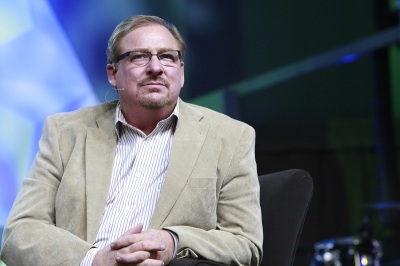Saddleback Church Hosts Historic Gathering on Mental Health and the Church

LAKE FOREST, Calif. – A historic, first-time gathering of leaders from both the evangelical and Catholic communities met on Friday to discuss the importance of churches working together to address critical mental health issues.
An overflow crowd of more than 3,300 people at Saddleback Church and an online audience for the live webcast witnessed the all-day unifying event, co-hosted by Rick and Kay Warren of Saddleback Church, the Most Rev. Kevin Vann, bishop of the Roman Catholic Diocese of Orange, and the National Alliance on Mental Illness-Orange County.
"To be able to call together the larger faith community is bittersweet, as we had hoped to share this moment with our son, talking about concern for people with mental illness," Kay Warren told reporters. "We do this in honor and memory of our son and others lost to mental illness, realizing there is hope for others dealing with this condition."
Purpose Driven Life author Rick Warren noted that during his more than 34 years as a pastor, he has struggled alongside people dealing with compulsions and fears. "I'm not an authority on mental illness, but I am an authority on living with mental illness," Warren said. He added that he wanted to "pull back the curtain" on his family's own struggles and tell people that it's perfectly fine to say, "I'm not okay, you're not okay, but that's okay because God's okay."

The event marked the first initiative in the Warrens' mission to remove the stigma of mental illness following the death of their son, Matthew, who took his life on April 5, 2013, after a lifelong struggle with mental illness.
The Gathering on Mental Health and the Church was designed to encourage individuals living with mental illness, educate family members, and equip church leaders to provide effective and compassionate care to any who face the challenges of mental illness.
In addition to authors and experts speaking on issues of mental health as they relate to the Church, several personal testimonies were given throughout the event by people who have struggled with mental illness.
David Mandani, 40, who was diagnosed with schizophrenia at age 18 and has been in remission since 1998, was the first to share his story. During a break in the conference, he told The Christian Post about his excitement over the ground-breaking event. His experience includes getting help from both the mental health clinical community and church, with a strong reliance on God, he said.
"It absolutely brings hope," Mandani said. "I know what it was like to go through depths of mental illness … to go through what I have gone through … to see what God wants to do and what he has done in my life. It's hope – the hope of Christ that will transform the lives of people who reach out to Him."
He added, "I can't even imagine if people would really grasp on to the truth, the idea that God is for you, that He's wept when, at least in my example, when I was broken, when I was struggling. He wept like it says in John 11:35, because He is a compassionate God. I don't know why He helped me, but I do know that at the center of my recovery was Christ."
Shortly after Mandani finished speaking, Warren explained, "Your chemistry in your brain is not your character, and your illness is not your identity. You are a follower of Christ who struggles with mental illness, and your struggle does not define you. Jesus defines you."
"A thousand years before you were born, God knew you would be here today," Warren added, encouraging the more than 600 in attendance struggling with a mental illness, according to organizers. "He wanted to bring you here to say to you, 'You matter to me. I love you, I created you, I formed you, I have a plan for your life greater than the pain you're going through. You are valuable, you are acceptable, you are lovable, you are forgivable and you are usable.'"

Plenary and workshop presenters at the more than 12-hour event included 25 religious, health and psychology professionals who addressed theoretical issues and practical solutions on a critical issue affecting 25 percent of all adults in the U.S. and 1 in 10 children during their formative years.
Topics encompassed the role of the Church in mental health; integrating physical, spiritual and mental health; crisis management for church staff; resourcing the Church; and supporting those suffering. In addition, 20 interactive workshops covered topics such as depression, stigma, suicide-risk reduction, church counseling, support groups and recovery ministries, bipolar disorder, eating disorders, addictions, and other subjects to bring hope to the challenges of mental illness.
"Western culture – or American culture – tends to rely on labels. They're limiting in a lot of ways, no matter what the label might be," said Bishop Vann. "We always have to let the Lord help us look and see the person behind the label who comes to us for help and healing."
Several speakers noted that the first place to which many turn for help is church or their faith leader, because "the heart of Jesus and the Church has always been for those who suffer." The consensus was that the Church has much to offer and needs to take the lead in the battle for mental health.
"There isn't a church or parish anywhere in the U.S. or the world that is not affected by mental illness," said Steve Pitman, president of NAMI-OC. "The only difference is that some churches want to lead, discuss it and shed light on it, and others don't."
To watch archived footage of the event or for more information, visit http://www.mentalhealthandthechurch.com.























